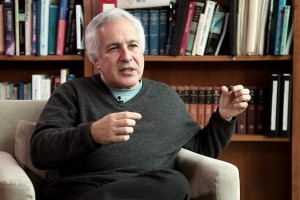Neuropragmatics and Language Therapy
Neuroscientist Friedemann Pulvermüller on brain activation, aphasia, and action-based language therapy
What is language good for? We could say that language is a symbol system, which is good for naming. Many philosophers said that the special thing about human languages is that you can name objects, you can say: “This is a glass” or “In there is water,” and putting labels on objects is actually the main function of language. Philosophers have argued otherwise, they have said: “Well, maybe not.” In the philosophy of language there’s a strong stream of researchers now saying that this labeling approach is entirely incorrect, and that, actually, language is a tool for action, and that what we actually use language for is to make requests like “I ask you to give me a glass of water” by saying “Water,” or “Please give me water,” or something like that.
So, we could say, as biologists, that this is actually the selection advantage of language, or one of the most important selection advantages. We can ask other people to do things for us, we can advise them in the hunting, we can cooperate in large communities.
This is the key aspect of language. So language is action, in this sense, a tool for making other people do what you want and also for interacting in a social manner.
So can we route this somehow in brain research? In recent studies published, for example, just in the beginning of 2016, my colleagues and I looked at the use of language structures such as words, sentences in different contexts. In one case they were just used as labels for objects, and the context was, for example, “What is this?” and the answer was “water”. In the other case somebody had water in front of them, and the second person said “Water” in the sense of “Please give me that glass of water,” and the other person handed over the object.

We looked at brain activation with a range of different methods such as EEG – electroencephalography – where you put electrodes on the top of the head and record neurophysiological signals. There is imaging – magnetoencephalography – where you record neural activity, but now the magnetic fields created by the little nerve cells when they get active in large numbers, together, at almost the same time. And there’s functional magnetic resonance imaging, which measures the blood flow, which changes as a result of brain activation.
What we saw was that in this context, where somebody was requesting the water from somebody else, brain activation was much higher compared with a naming context. So the brain appears to care more about language use when it has a real purpose in communication. When language was just used as a label for objects there was much less brain activation. And this difference arose already very early on, within 100–200 milliseconds after the word could first be understood. This indicates that this understanding of the action relevance of an utterance happens very fast, rapidly, super fast. Of course, it may be of relevance for some philosophical issues.
You may say that those philosophers who said that language function is more important than just labeling objects were right, because our brain is more active. However, this inference scheme might not be fully convincing, because philosophers may also say: “What should I care about brain activation?”
However, what could we do with this fact? Well, we recently translated it into language therapy for patients who had a stroke, or who suffer from a severe neurological disease and cannot speak anymore, or have big problems uttering words, sentences, even understanding single words, and we provide therapy for them. Some of them actually have a problem in their brain, a neurological problem, and neurological language deficits which occur in adults due to brain lesions are called aphasia. Aphasia therapy is very important for helping those patients to improve their language deficits. If we practice with these patients for a few weeks and do it very intensively, we may see surprising improvements in their language skills.

We created a method for aphasia therapy, which now takes advantage of this language embedding into action. In the classical context language therapy is frequently object labeling, so when language had this request function the therapy effect was, at least in some populations, significantly better than in the object labeling, naming context. This indicates that insights from basic science and, taking one more step to the past, actually insights from language philosophy can have an impact on everyday therapy of language.
We implemented this philosophical and neurophysiological insight by having people, our patients, interact with language, so they sat there and asked the other patients or their therapist for coffee, for water, for sweets, and they exchanged objects or just picture cards in that context. So patients with a severe neurological disease can actually profit from philosophy, neural imaging, or our modern neuroscience research, if it works.
To conclude, we could say that philosophy and modern cognitive neuroscience results are not just for fun. We can see that if we apply the insights from these disciplines in the therapy of aphasia, we can improve the methods, and we can end up with better outcomes if we follow some of the theoretical guidelines and actually get inspired by the brain activation results.
So to wrap up, we know from philosophy that language is not just a labeling tool, but that its most important function is to support action and social interaction. We know from neuroscience that if we embed language in action contexts and request rather than label, our brain activates much more. We can use this information to provide an action-based language therapy – we call it Intensive Language Action therapy – which appears to help patients more than labeling therapy.

Neuroscientist Friedemann Pulvermüller on brain activation, aphasia, and action-based language therapy

Biologist Catherine Dulac on the stages of information processing in the brain, methods of recording neural ac...

Neurobiologist Jeff Lichtman on brain cell connections, Golgi stain, and big data in neurophysiology